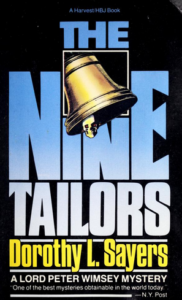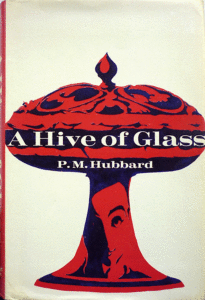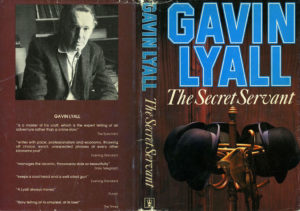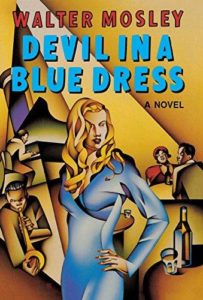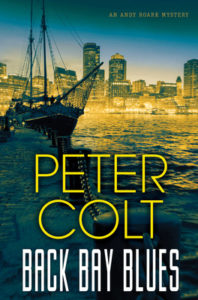I can’t tell you exactly when or how I fell in love with detective fiction, the more hardboiled, the better. It was probably Raymond Chandler’s fault. His vision of sun dappled, or rain drenched L.A. hooked me. Or maybe it was the hard-drinking tough guy who can take a punch but is always fighting the “good fight” Philip Marlowe, Spenser, Lew Archer, and their whole profession sucked me in.
While I love the classic, hardboiled, fuel for film noir stuff, I came to realize there is a neat subset of detective fiction that I have dubbed “The Unlikely Detective.” In my mind, the Unlikely Detective is not a private detective belting back bourbon in a lonely office, .38 under his arm, waiting for a client to walk in, but it is the amateur, that guy or gal who doesn’t have a license, who isn’t looking for a case but somehow gets mixed up in one. They certainly aren’t cops, forensic specialists, attorneys or medical examiners but someone who finds themselves in the middle of a mystery with none of the licenses or the training. This is my list of Unlikely Detectives as I think of them. This is not a definitive list, and I am sure that I have left out many deserving books and detectives, but this is a pretty good start.
Dorothy L. Sayers, The Nine Tailors
The Nine Tailors by Dorothy L. Sayers was published in 1934 and was considered by many to be the best of her Lord Peter Wimsey novels. I don’t know if it is her best, but it was one of the first that I read, and I liked it. Sayers’s protagonist Lord Peter Wimsey is an Unlikely Detective. He is an English aristocrat, wealthy and cultured, thus he is free from worrying about clients or fees. He is a detective by choice and not being coerced into it by the universal need to eat.
Wimsey is a veteran of World War I where he did intelligence work and then ended up as a line officer. When we first meet him, he is a witty playboy who is accompanied by Bunter his batman (officers in the British Army were assigned manservants) who stayed with Wimsey after the war and is the Watson to Wimsey’s Holmes.
The Nine Tailors finds Wimsey stranded in a quaint English village on New Year’s Eve where he ends up celebrating the New Year by helping ring the celebratory church bells. The next day the first body turns up, and then another. Wimsey begins looking into a series of tragedies that seem to be happening to a local aristocratic family, all of which leads to stolen jewelry and a deserter from the French battlefields of the Great War. Wimsey, of course, approaches the case with his debonair style, toughness, and charm. I don’t love all of the Lord Peter Wimsey stories, but The Nine Tailors is worth reading.
Jonathan Kellerman, Over the Edge
Jonathan Kellerman’s Alex Delaware is a great example of an Unlikely Detective. Delaware is a child psychologist, who, in the first book, has stopped practicing due to burnout. By Over the Edge, the third book in Kellerman’s prolific series of novels starring Delaware, he is doing some consulting, some of which is with the Los Angeles Police Department.
ver the Edge opens with Delaware being woken up at night by a phone call from a former patient, a child genius, now a young man. The call is rambling, frightening and at times incoherent, prompting Delaware to drive out to the hospital where his former patient is being treated. Delaware arrives to find a very cold shoulder and the fact that his patient has escaped from a locked ward. We soon find out that the young man is the prime suspect in the serial killings of male prostitutes.
Delaware is compelled to save his former patient. This forces him to dig deep into his memories of their sessions together, and not only solve the case but to help his former patient psychologically as well. Like many of the Alex Delaware novels, this is really two mysteries in one: one about the murders, the other about the alleged killer’s psychological treatment. It works because of Kellerman’s subject matter expertise and the fact that he can write.
Like Lord Peter Wimsey, Alex Delaware is not a private eye or a cop. He is not rich but lives comfortably off his investments, and the last thing he needs is the trouble the cases bring to him. Also, like Wimsey, Delaware suffers from PTSD to some extent. Delaware is an amateur who doesn’t solve mysteries for the money, isn’t a cop and certainly doesn’t need the aggravation. I would submit that any of the Alex Delaware novels would be a good example of the Unlikely Detective but, like the man says, “There can be only one…”
P.M. Hubbard, Hive of Glass
Hive of Glass is a great example of an Unlikely Detective, except that the story itself isn’t exactly a mystery, it isn’t exactly a gothic novel and it isn’t just a brilliant character study in obsessive behavior. Published in 1965 and long out of print—finding a copy is a mystery in its own right—Hubbard tells the story of Johnnie Slade who is a collector of rare glass.
Our introduction to Slade brilliantly reveals his strength and tragic flaw to the reader, as Slade spots a valuable antique glass in shop. The owner doesn’t immediately realize its value, and when he does and tries to correct his mistake, he is almost assaulted by Slade who runs away with the glass in hand. As the novel progresses, Slade learns of a rare Italian Tazza, his quest for the Tazza will lead Slade first to a dead body and then to a remote English village where Hive of Glass takes on an almost Gothic tone. The nature in and around the village is almost overwhelming, almost a character in the book.
Many people have compared Hive of Glass to The Maltese Falcon. Both center around the hunt for a priceless work of art and how far people will go to satisfy their obsessions. What makes Hive of Glass truly brilliant is that Johnnie Slade is no Sam Spade. Spade has a moral code, a sense of honor that drives him to forsake the woman he loves to honor his dead partner. Johnnie Slade has no such problem. He is obsessed with the Tazza, if he can’t have it then he wants to make sure that no one else can. Hive of Glass is like a reimagined version of The Maltese Falcon wherein Joel Cairo or Casper Gutman are the protagonists. Johnnie Slade is no private detective, but he ends up involved in a mystery as a very Unlikely Detective.
Robert Barnard, A Scandal in Belgravia
Robert Barnard’s protagonist and Unlikely Detective is Peter Proctor, a retired Member of Parliament who has decided to fill his time by writing his memoirs. Proctor finds himself quickly hobbled by writer’s block after a couple of chapters. His mind is trapped in the 1950s when he first started at the Foreign Office. Proctor is out of place and doomed to mediocrity because he went to the wrong schools as well as being from the wrong class. He makes quick friends with young aristocrat Timothy Wycliffe who went to the right schools and is of the right class. Wycliffe is out of place at the Foreign Office because he is a homosexual, which was, in 1950s England, against the law.
Proctor and Wycliffe develop a friendship set against the backdrop of classism and prejudice in 1950s London. Barnard expertly paints an accurate picture of the inner workings of government and deftly illustrates the chaos created by the Suez Crisis. It is against this backdrop that Wycliffe is murdered, and Proctor becomes more engrossed in his career, eventually moving from the Foreign Office to Parliament.
Years later while working on his memoirs, he realizes he doesn’t know much about the murder and begins to look into it. Wycliffe’s family is still alive, and the murder is very much a sensitive subject to the aristocrats, as Wycliffe was allegedly bludgeoned to death by his male lover. Proctor is a very Unlikely Detective, as he is in his sixties, and, as former public figure, seems to be about as far from Philip Marlowe and his ilk as one can get. Proctor becomes compelled to investigate, driven by his doubts about whether he was a good friend to Wycliffe, recognizing that he was unable to get close to Wycliffe because he is gay. The story is a great example of an Unlikely Detective, and the ending has a twist I didn’t see coming.
Gavin Lyall, The Secret Servant
Ok, I am breaking the rules here since this book is technically an espionage novel. Lyall was a British Royal Air Force pilot in the postwar years who wrote successful adventure/thriller novels in the 1960s and 1970s. In 1980, he wrote The Secret Servant, which was departure because it was an espionage novel and the protagonist was a soldier and not a pilot. The Secret Servant is a spy novel that is wrapped around a murder/blackmail story.
The protagonist, Major Harry Maxim, British Special Air Service, widowed single father, finds himself attached to the Office of the Prime Minister as a special advisor on defense matters. Harry isn’t a fish out of water but, rather, a whale. He arrives for his first day at work with a thirty-eight revolver under his arm, much to the shock and dismay of the foreign office and political types. He is sneered at by the MI-5 liaison who thinks that he is simply a bull in a china shop, unsuited to the subtleties of politics or espionage. She isn’t wrong. Harry would rather be chasing terrorists and testing his mettle against the Soviet Army than working the dull desk job at Number 10.
Before Harry has settled in, a training grenade thrown into Number 10 Downing Street starts a chain of events that forces Maxim into the world of spies and secrets, as he is forced to determine if a top government advisor is vulnerable to blackmail by the KGB. Maxim’s skill as an SAS commando, his brains and his sheer determination carry him through. He is a bull in a china shop, but that is exactly what the situation needs.
Maxim is a most Unlikely Detective. He is an SAS commando, an elite soldier, not a detective or spy. Maxim is out of his element, and the mystery on the surface is whether he will get fired from his current assignment. Major Maxim is an Unlikely Detective by virtue of the assignment he is given and, just like Spade, Marlowe, Archer or Spenser, he cracks the case.

Rick Boyer, Billingsgate Shoal
Doc Adams isn’t a cop or private eye. He has a brother who is a Massachusetts State Policeman, but that is as close as he gets. He is a successful dental surgeon, and the cases he takes have more to do with molars than the Maltese Falcon. He is happily married; his boys are college-aged and the nest is mostly empty. Adams is bored with his career and bordering on mid-life crisis territory. His doesn’t involve a red sportscar or a buxom blonde half his age but, rather, a murder mystery.
What makes him shine in the role of the Unlikely Detective is that he has what anyone would consider a good job, a good life. He isn’t the type one would picture in seedy back alleys or dark dive bars. He doesn’t consort with or even know any criminals. Doc Adams is supposed to be the guy reading mystery novels and not starring in them.
Adams becomes an Unlikely Detective with the murder of a young man who is a family friend. Adams may have unintentionally encouraged the young man to go into harm’s way. That murder leads the good doctor into another murder mystery, gun running and hidden treasure. Adams is unique, not just as an Unlikely Detective but because he is the only character, I have ever read about in a mystery story who uses a sailboat to get around. Imagine Spenser tailing someone in a Catboat?
Arturo Perez-Reverte, The Club Dumas
The protagonist of Arturo Perez-Reverte’s excellent The Club Dumas is Lucas Corso. Corso is a very Unlikely Detective, as he is a mercenary of a sort, whose moral code, if it can’t be bought, can certainly be rented if the price is right. Corso is referred to as a book mercenary who, for the right price, will chase down rare books and acquire by means fair and foul. He draws the line at murder. Corso lives out of a canvas shoulder bag that he carries his tools of the trade in, passport, cash, notebooks, pens and manuscripts. His clients are rich and, as the rich often are, unscrupulous when it comes to acquiring their desires. Corso is their guy.
He is hired to find a rare portion of the original manuscript of The Three Musketeers by Alexandre Dumas. Corso moves through Europe meeting with collectors and dealers, femme fatales and a mysterious young woman. His search for the manuscript brings him into contact with a secret society, devil worship, murder and characters that are straight out of the book he is looking for. The Club Dumas is an intellectual puzzle wrapped in a mystery story and, like Hive of Glass, provides a close look at the dark side of collecting.
Corso is an Unlikely Detective in that he lacks the moral clarity of Sam Spade. If Corso were in The Maltese Falcon, he would marry Brigid O’Shaughnessy and keep whatever ill-gotten gains there were, only to leave her for Archer’s wife and the life insurance money. Corso is not tough; he loses almost every fight he is in and definitely adheres to the adage about discretion and valor. He is more of a thief or con man than a detective and a refreshingly unique character.
Walter Mosley, Devil in a Blue Dress
This is the one that started this whole train of thought. I was working on one of my novels with its very conventional detective and all I could think of was Easy Rawlins. As my guy is getting ready to go out looking for a missing teen, I was wondering if Easy were in the same situation, would he rather be at home with a drink, listening to a fight on the radio? After all, Easy never wanted to be a detective, it was thrust on him.
Ezekiel “Easy” Rawlins is a World War II veteran who is originally from Houston. He is laid off from his job as a defense contractor and ends up drinking in another Houstonian’s bar. While there, he is hired by a white man to find a white woman named Daphne Monet who frequents black jazz clubs. It doesn’t take long for bodies to appear, putting Rawlins into it up to his neck. Like all the best mysteries, this one has the potent combination of murder and blackmail.
Easy Rawlins is an Unlikely Detective because it is the last thing he wants to do. He would much rather have his job at the defense plant, to make his mortgage payments and live the American dream. The problem is that in 1940s Los Angeles, that dream is harder to realize for some more than others. Rawlins is black, the racism of the 1940s is pervasive and Rawlins quickly runs out of options to save his bit of the American Dream. Once he reluctantly becomes a detective and is thrust deeper into the case, racism becomes even more acute when he is dealing with the police. Racism is a constant backbeat, the bass notes to the story. It is always there, but it isn’t the whole story. Walter Mosley does a brilliant job of using fiction to address racism and by driving the plot with it. He also tells us a great detective story about a guy who just wants to be an average Joe and ends up an Unlikely Detective.
***


